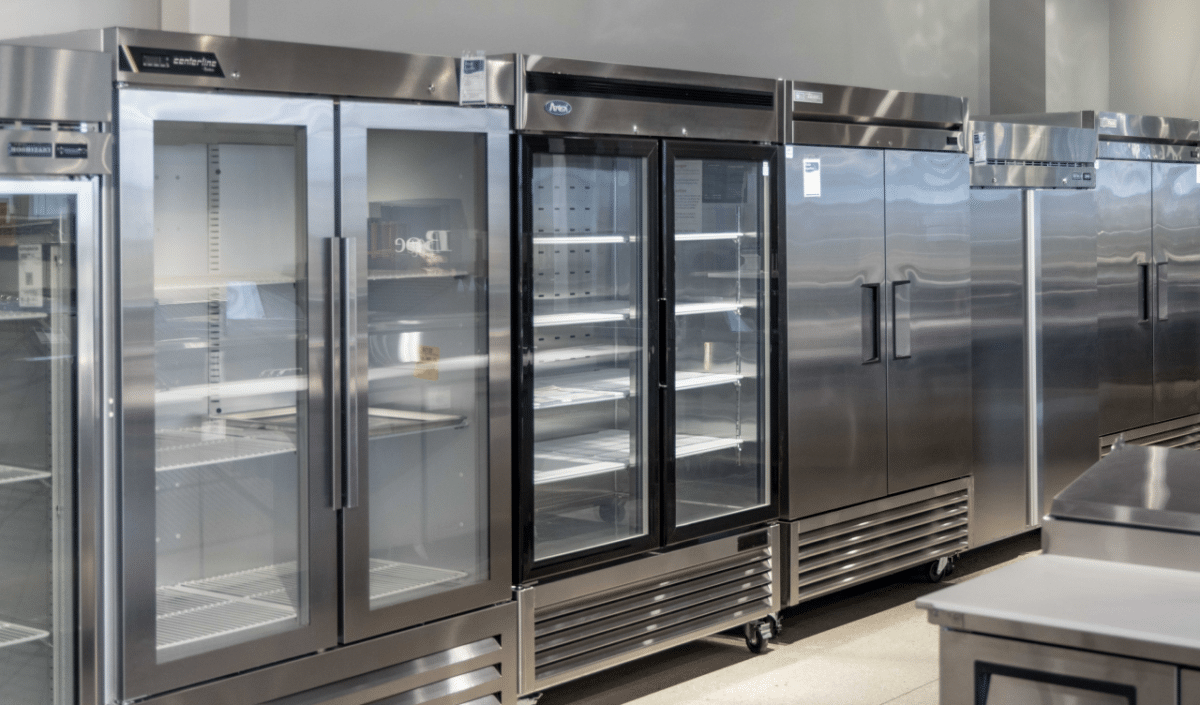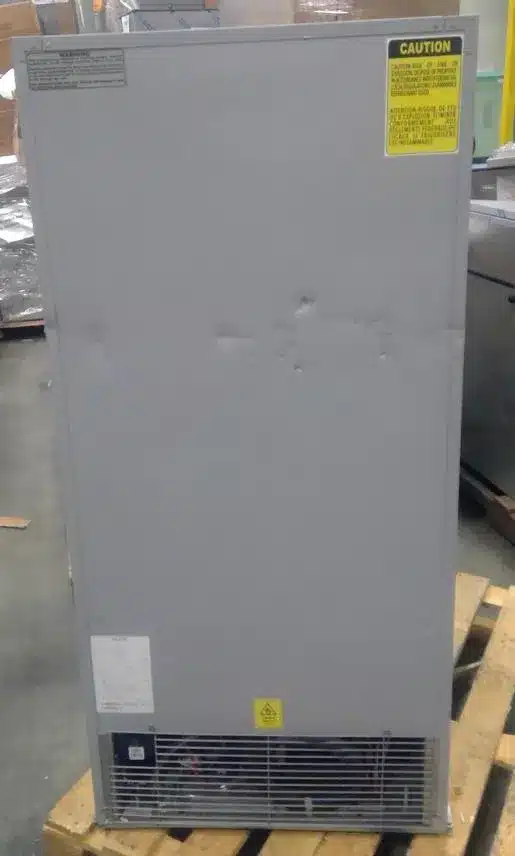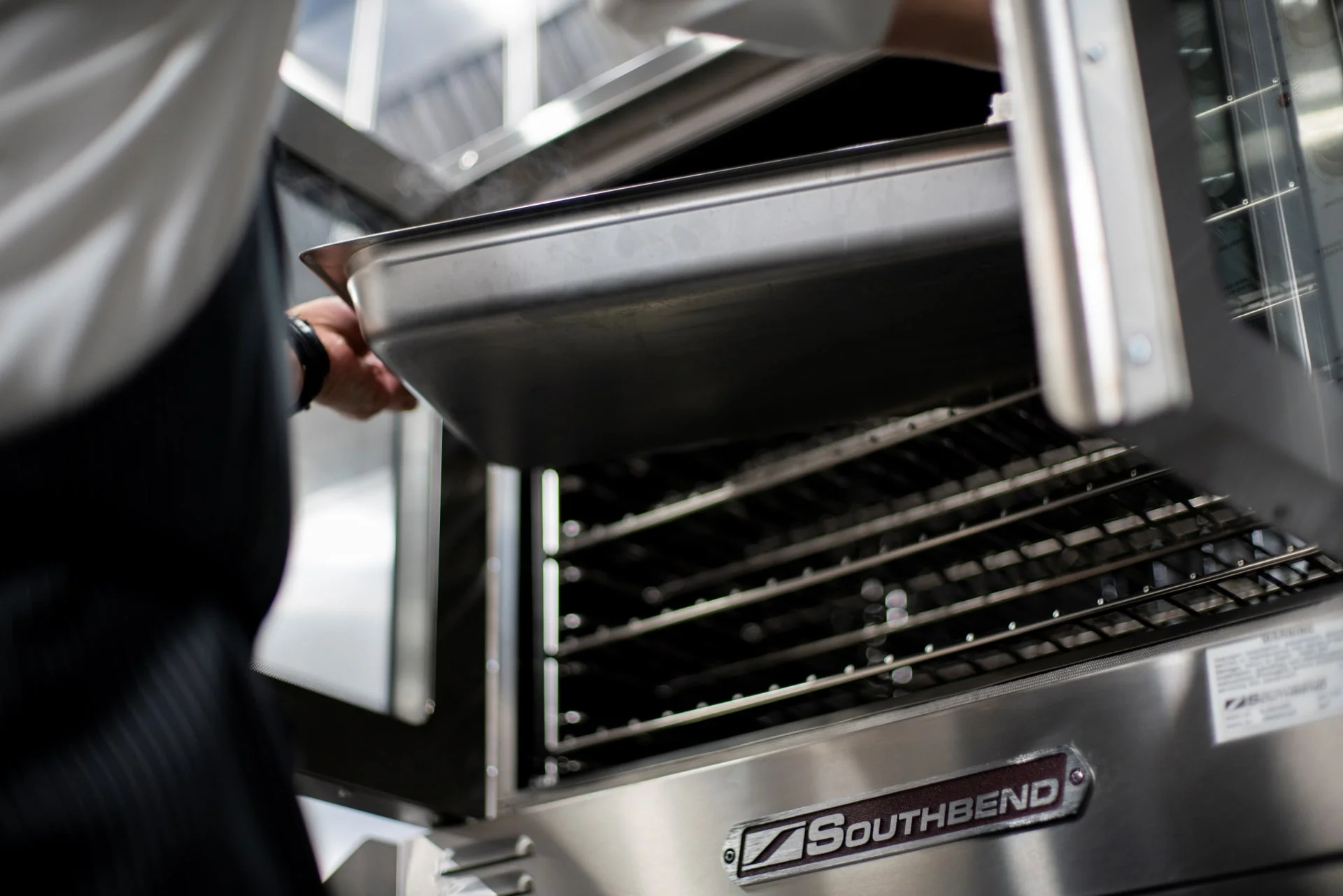Should I Buy Scratch and Dent Restaurant Equipment?

Appliances are one of the largest expenses in equipping and starting a new commercial kitchen. Ranges, ovens, broilers, fryers, and coolers can run tens of thousands of dollars apiece! Many people search for used and discounted restaurant equipment to save costs, but used items come with histories and aren’t usually covered under any warranties. They might come dirty and will probably need costly repairs sooner than you would like.
What Are Scratch and Dent Appliances?
Enter scratch and dent equipment! Scratch and dent equipment is brand new but is for sale at a highly discounted price because of cosmetic imperfections like—you guessed it—scratches and dents. They may also be factory showroom or demo items, open box or overstock equipment, or a floor model.
Since scratch and dent equipment is brand new, they are covered under the original warranty and should perform exactly as well as any other new appliances. You’ll get the full lifespan, functionality, and coverage of a new item at the cost of a used one—it’s the best of both worlds!
All that money you’ll save can go straight toward other expenses like utility costs, smallwares, dining room equipment, and overhead – that is, if you can handle looking at a little scratch in the kitchen here and there!
Exactly How Much Damage Are We Talking Here?
Eleven36 has the best selection of scratch and dent restaurant equipment, all labeled according to their conditions. But even with cosmetic damage or light use, you can be sure you’ll get high-quality equipment to handle anything your kitchen throws at them. We only offer the best brands with the most reliable performances, which means our Scratch and Dent Series provides the best bang for the least buck!
We offer a selection of different types of scratch and dent labels:

- New: These products are new and have never been used.
- Overstock: These products are new, overstock, or discontinued, and have never been used.
- New-Showroom/Industry Demo: These products were used for showroom or industry show demonstration but are otherwise new.
- New-Minor Imperfections: These products may have small scratches or dents that do not affect their use or functionality.
- New-Major Imperfections: These products may have multiple scratches or large dents that do not affect their use or functionality.
- Certified Refurbished: These products have been refurbished to like-new conditions. Both the condition and function have been certified by an industry technician. Refurbished items may also come labeled with minor or major imperfections.
- Factory Refurbished: These products have been refurbished by the original manufacturer. They may have multiple scratches or major dents that do not affect their use or functionality and may still be covered under warranty.
Purchasing discount restaurant equipment from our Scratch and Dent Series can save you up to 60% of the cost of new equipment. You’ll be able to rest easily, knowing you are staying within your budget while still getting the best quality appliances for your restaurant kitchen!
The Great Debate: New vs. Used
The price tag on used equipment can be enticing! You can expect to pay no more than 50% to 60% of the new retail value for a used commercial kitchen range, oven, fryer, or broiler. If the item is older or heavily used, it is possible to find it for as low as 30% of the original cost. Plus, you can always negotiate costs with private sellers, which you usually can’t do when purchasing from a restaurant supply company or manufacturer.
However, greater savings up front may end up evening out in the long run. Increased repair and replacement costs, less energy efficiency (older models are less likely to be Energy-star rated), breakdowns in the middle of service, and even failed health inspections can all be costly problems that result from buying non-certified used equipment.
Don’t Dent Your Ego: Buying Tips for Used Restaurant Equipment
That said, there is a right time and place for used equipment and a right way to find the best option for you!
Here is a helpful list of tips you can use to make sure you’re getting a great deal and a used good appliance:
- Shop from a reputable used appliance dealer. Dealers who make it their business to sell used equipment have a vested interest in selling equipment that will perform well in a new kitchen. Otherwise, they’d be risking their reputation and their business!
- If buying from a private seller, thoroughly research the type of food service establishment the appliance came from and why it shut down. Were they shut down because of health code violations? Did their kitchen ever have a fire that might have damaged their appliances? How long were they open? And how much business did they regularly do while open? These questions can help you determine how much use the appliances may have seen and how much they should cost.
- Have your executive chef confirm that the equipment will be adequate for your kitchen layout and menu, and have the item inspected by a trained technician to ensure it is properly functioning.
- Ask for any warranty paperwork and original purchase paperwork for your records.
- Inspect the item for imperfections that can help you negotiate a lower cost.
- Double-check that the item will fit correctly in your space.
- Research the brand and model number to determine an appropriate price.
- Auctions can be a great place to purchase used equipment since they often inspect the items and will usually verify its ownership/use history for you.
Here are some things to avoid:
- Don’t buy equipment if there is visible rust, significant damage, or residue/buildup on the gas, electrical, or fuel pumps/lines.
- Avoid equipment if you can’t verify its restaurant/use/ownership history.
- Avoid very old models since parts can be challenging to obtain if they are no longer actively manufactured.
- Major refrigerator and freezer repairs can cost more than their original full price, so it’s not usually worth buying them used. They also wear down quickly, so you will not get as much use out of them as you would from a range or convection oven.
Just Scratching the Surface: Warranty & Guarantee Considerations
One of the most significant differences between buying new and used is the warranty and protection coverage. New commercial equipment comes with manufacturer’s warranties that will cover you if your appliances break down or need replacing. But did you know there are several types of warranties and protection options?
Refurbished items often have limited warranties, while used items usually don’t have any coverage at all, but that’s not always the case. Here is a list of alternative types of protection and guarantee coverages:
- Dealer Warranties: Appliance distributors or sellers can offer their own protection above the manufacturer’s warranty. They will usually cover malfunctions that result from repair or defects rather than complete appliance failures that require replacements. These warranties are often found on certified refurbished or used appliances sold by appliance dealers, but not by private sellers.
- Extended Warranties: Sometimes, dealer warranties or the original manufacturer’s warranties will extend their coverage period under certain circumstances. These extensions can usually be purchased along with the original appliance, but they can sometimes also be obtained later.
- Expressed Warranties: Expressed warranties guarantee that the appliance you purchase will function in the way that the seller expressly promised or guaranteed, either verbally or on paper. If the appliance doesn’t do what the dealer said it would, you should be able to return it or get a refund for the cost of repairs.
- Implied Warranties: Sometimes, appliances fail to function or perform specific tasks that they should be able to, given the type of appliance. For instance, it is implied that your broiler needs to be able to broil food. If it doesn’t, you should be able to request a repair or replacement without them explicitly stating that it is covered.

Don’t Settle for Less Than the Best!
When you’re working on purchasing your new commercial appliances, it’s crucial to equip yourself with quality appliances that will get the job done and keep your doors open for service. But it can be hard to stretch your startup funds with so much equipment to buy!
The best options for new items at used prices are scratch and dent items. If you can overlook a little dent here and a few scratches there, you’ll be setting yourself up for success!
